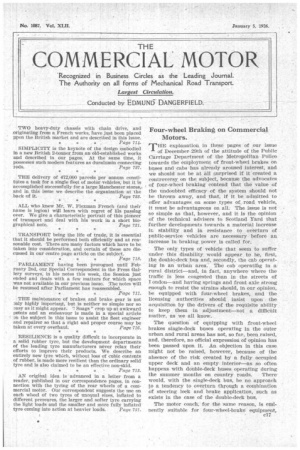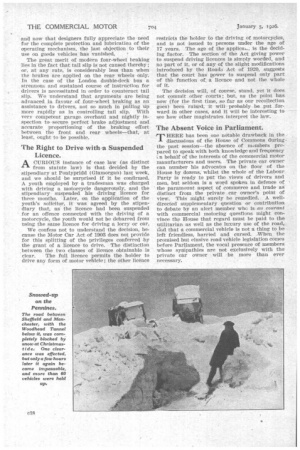Four-wheel Braking on Commercial Motors.
Page 1

Page 2

If you've noticed an error in this article please click here to report it so we can fix it.
THE explanation in these pages of our issue of December 29th of the attitude of the Public Carriage Department of the Metropolitan Police towards the employment of front-wheel brakes on buses and cabs has already aroused interest, and we should not be at all surprised if it created a controversy on the subject, because the advocates of four-wheel braking contend that the value of the undoubted efficacy of the system should not be thrown away, and that, if it be admitted to offer advantages on some types of road vehicle, it must be advantageous on all. The issue is not so simple as that, however, and it is the opinion of the technical advisers to Scotland Yard that further developments towards a material increase in stability and in resistance to overturn of public-service vehicles are necessary before an increase in braking power is called for.
The only types of vehicle that seem to suffer under this disability would appear to be, first, the double-deck bus and, secondly, the cab operating in an urban area." The cab operatitg in a rural district—and, in fact, anywhere where the traffic is less congested than in the streets of I ondon—and having springs and front axle strong enough to resist the strains should, in our opinion, be equipped with four-wheel brakes, and the licensing authorities should insist upon the acquisition by the drivers of the requisite ability to keep them in adjustment—not a difficult matter, as we all know.
The question of equipping with front-wheel brakes single-deck buses operating in the outer urban and rural areas has not, so far, been raised, and, therefore, no official expression of opinion has been passed upon it. An objection in this case might not be raised, however, because of the absence of the risk created by a fully occupied upper deck and an empty interior—as so often happens with double-deck buses operating during the summer months on country roads. There would, with the single-deck bus, be no approach to a tendency to overturn through a combination of steering lock and brake application, such as exists in the case of the double-deck bus.
The motor coach, for the same reason, is eminently suitable for four-wheel-brake equipment, and now that designers fully appreciate the need for the complete protection and lubrication of the operating mechanism, the last objection to their use on goods vehicles has vanished.
The great merit of modern four-wheel braking lies in the fact that tail slip is not caused thereby; or, at any rate, is considerably less than when the brakes are applied on the rear wheels only. In the ease of the London double-deck bus a strenuous and sustained course of instruction for drivers is n.ecessitated in order to counteract tail slip. We understand that arguments are being advanced in favour of four-wheel braking as an assistance to drivers, not so much in pulling up more rapidly as in controlling tail slip. With very competent garage overhaul and nightly inspection to secure perfect brake adjustment and accurate proportioning of the braking effort between the front and rear wheels—that, at least, ought to be possible.
The Right to Drive with-a Suspended Licence.
ACURIOUS instance of ease law (as distinct from statute law) is that decided by the stipendiary at Pontypridd (Glamorgan) last week, and we should be surprised if it be confirmed. A youth employed by a tradesman was charged with driving a motorcycle dangerously, and the stipendiary suspended his driving licence for three months. Later, on the application of the youth's solicitor, it was agreed by the stipendiary that, as the licence had been suspended for an offence connected with the driving of a motorcycle, the youth would not be debarred from using the same licence for driving a lorry or car. We confess not to understand the decision, because the Motor Car Act of 1903 does not provide for this splitting of the privileges conferred by the grant of a licence to drive. The distinction between the two classes of licence obtainable is clear. The full licence permits the holder to drive any form of motor vehicle; the other licence restricts the holder to the driving of motorcycles, and is not issued to persons under the age of 17 years. The age of the applicar— is the deciding factor. The section of the Act giving power to suspend driving licences is simply worded, and no part of it, or of any of the slight modifications introduced by the Road.5 Act of 1920, suggests that the court has power to suspend only part of the function of a licence and not the whole of it.
The decision will, of course, stand, yet it does not commit other courts; but, as the point has nOw (for the first time, so far as our recollection goes) been raised, it will probably be put forward in other cases, and it will be interesting to see how other magistrates, interpret the law.
The Absent Voice in Parliament.
THERE has been one notable drawback in the discussions of the House of Commons during the past session—the absence of nambers prepared to speak with both knowledge and frequency n behalf of the interests of the commercial motor manufacturers and users. The private car owner can number his advocates on the floor of the House by dozens, whilst the whole of the Labour Party is ready to put the views of drivers and men, but seldom is a word spoken in defence of the paramount aspect of commerce and trade as distinct from the private ear owner's point of view. This might surely be remedied. A welldirected supplementary question or contribution to debate by an alert member who is au courant with commercial motoring questions might convince the House that regard must be paid to the utilitarian as well as the luxury use of the road, 1.:nd that a commercial vehicle Is not a thing to be left friendless, harried and cursed. When the promised but elusive road vehicle legislation comes before Parliament, the vocal presence of members whose sympathies are not exclusively with the private car owner will be more than ever necessary.
































